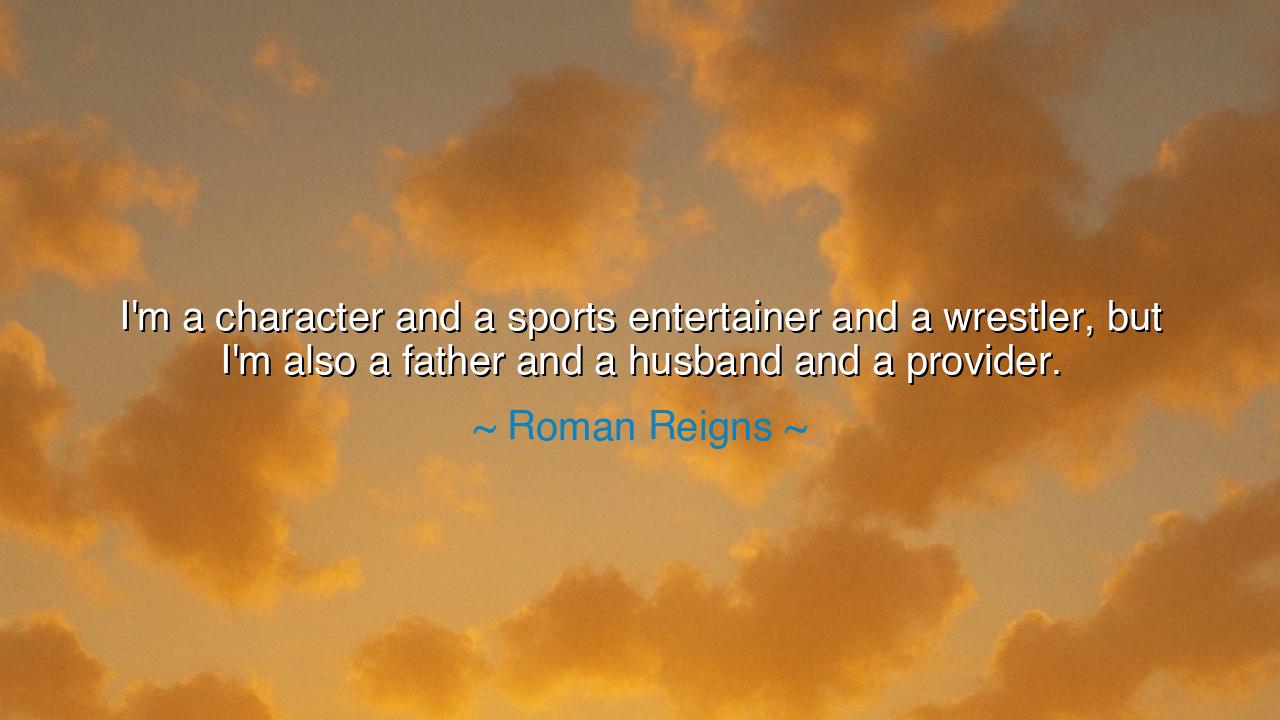
I'm a character and a sports entertainer and a wrestler, but I'm
I'm a character and a sports entertainer and a wrestler, but I'm also a father and a husband and a provider.






Roman Reigns, in declaring, “I’m a character and a sports entertainer and a wrestler, but I’m also a father and a husband and a provider,” reveals the eternal struggle of identity—the balance between the roles we play before the world and the sacred duties we fulfill in the quiet of our homes. His words are not merely about fame or profession, but about the harmony of the public and the private, the warrior on the stage and the guardian in the household.
The ancients would have understood this tension well. In Rome, the gladiator was revered for his strength in the arena, yet even he was also son, brother, or father to someone beyond the roar of the crowd. The great leaders of history—kings, generals, poets—carried with them not just crowns or swords, but also the unseen weight of their families. To proclaim oneself a wrestler and a provider in the same breath is to recognize that life’s greatest victories are not always won beneath the lights, but within the home.
Reigns’ words remind us that the character seen by the world is only a fragment of the whole person. On the stage, he may be larger than life, a hero or villain crafted for spectacle, but beneath the armor stands the man who wakes each day to the duties of love. This humility, the acknowledgment that the father and the husband are as vital as the warrior, is a truth as old as time. For what good is glory in the arena if one fails those who wait at home?
History offers us stories that echo this wisdom. Consider Marcus Aurelius, emperor of Rome, who commanded armies and ruled an empire, yet who in his Meditations spoke not of conquest but of his devotion to family, philosophy, and the duties of everyday life. Or think of George Washington, who after victory in war and leadership in the founding of a nation, longed only to return to Mount Vernon, to live as husband, farmer, and caretaker. These men, like Reigns, knew that greatness is not defined solely by the roles seen in public, but also by the unseen sacrifices made in private.
The quote also teaches us that life is not a single identity but a tapestry of roles. To be a sports entertainer requires discipline, resilience, and performance; to be a father and provider requires tenderness, patience, and strength of a different kind. True greatness lies not in excelling at one alone, but in holding them all together with honor. The ability to switch from the stage of spectacle to the sanctuary of family without losing oneself is a mark of wisdom and maturity.
For those who hear these words, the lesson is clear: do not mistake your work, your title, or your outward character for the entirety of who you are. Remember the roles that do not come with applause—the moments of quiet sacrifice, of teaching your children, of standing beside your partner, of providing for those you love. These are the victories that will outlast fame, for they are etched not in headlines, but in the hearts of those whose lives you touch.
Therefore, learn from Roman Reigns: embrace every part of your identity. Be strong in your craft, fearless in your calling, but never neglect the sacred duties of home. For when the lights fade and the crowd falls silent, what remains is not the roar of the arena but the bonds of family. To be a champion in both worlds—this is the path of true greatness.






AAdministratorAdministrator
Welcome, honored guests. Please leave a comment, we will respond soon